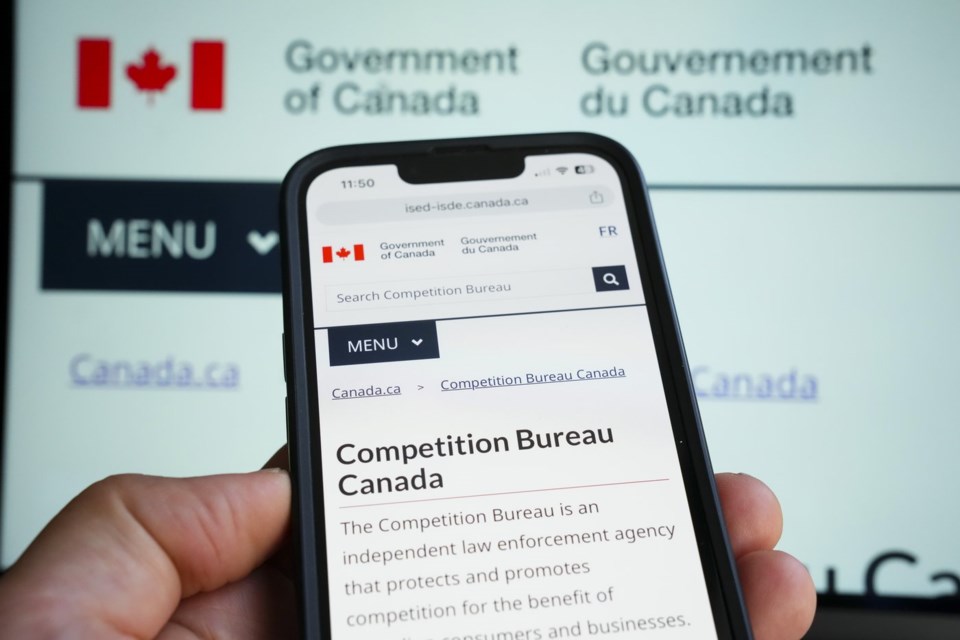The Competition Bureau has released its final anti-greenwashing guidelines after considering more than 400 responses to the legislation that took effect about a year ago.
"While a lot of the feedback in the submissions is reflected in the final guidance, some is not," the bureau said in a backgrounder accompanying Thursday's announcement.
For instance, some suggested the guidelines spell out for businesses exactly what environmental claims they can make in their marketing material and when. But the bureau said amendments to the Competition Act that passed in June 2024 include no such rules.
"Instead, the act allows businesses to make whatever environmental claims they wish, as long as those claims are not false or misleading, and as long as those claims are adequately and properly tested or substantiated where required," the bureau said.
"This requires an assessment not only of the literal wording of a claim, but also of the general impression created by the advertisement as a whole, including the words, images and layout."
The agency also received suggestions that it said would mean acting beyond its legal authority. The bureau said some commenters encouraged it to act as gatekeeper for private citizens wanting to launch a challenge, but it said that is the responsibility of the Competition Tribunal. The bureau added it should be left up to the courts to interpret terminology included in the legislation.
Some of those weighing in argued that the bureau's enforcement of greenwashing provisions should mirror that of securities law, but the guidance says there should be a distinction between the two.
"In the bureau’s view, the protections afforded to ordinary consumers under the act should not be limited to the protections afforded to people who are seeking to invest in capital markets," it said.
The new Competition Act provisions dealing with greenwashing require that companies' environmental claims be based on "adequate and proper testing" and "proper substantiation in accordance with an internationally recognized methodology."
When draft guidelines were released in December and put to public consultation, questions were raised about what exactly "internationally recognized methodology" entails. In the final guidelines, the bureau said it would likely pass muster if it were recognized in two or more countries — but not necessarily by those countries' governments.
The bureau said it has taken enforcement action on two environmental claims over the past two years — against coffee-pod maker Keurig and automaker Volkswagen — under deceptive marketing practices provisions. Violations under those provisions can lead to fines of $10 million or higher.
Energy sector players are among those who have raised concerns about the legislation, with many clamming up on their climate communications in response.
Shortly after the law passed, the Pathways Alliance — a group of oilsands majors planning to capture and store carbon dioxide emissions from their operations — removed virtually all content from its website and social media feeds, citing uncertainty over the rules.
"While Greenpeace would argue the oilsands' greenwashing was always illegal, the new rules make it abundantly clear that the Pathways Alliance's net zero claims do not pass the sniff test, which is likely why the companies so abruptly deleted them and their social media history," said Keith Stewart, senior energy strategist with Greenpeace Canada.
"The climate change-fuelled wildfires that have driven tens of thousands of Canadians out of their homes again this year are a stark illustration of how making false environmental claims to delay real climate action is not a victimless crime."
Alberta Premier Danielle Smith has spoken out against the greenwashing rules, among a litany of other federal environmental moves.
On Thursday, her environment minister said the guidelines send the wrong signal to markets and industry.
"The federal government has committed to Albertans and all Canadians to making Canada an energy superpower," Rebecca Schulz said in a statement.
"More fancy rhetoric and mixed messages will not make Canada an energy superpower, especially while Ottawa is upholding censorship laws that prevent businesses from talking about the very work and goals needed to build us into that superpower."
A day after the April federal election, the Canadian Association of Energy Contractors laid out its priorities for the Liberal government in Ottawa, including that it "scrap greenwashing legislation that unfairly silences Canadian companies from showcasing their world-leading environmental performance and economic contributions."
In April, Canada's largest bank dropped its target of facilitating $500 billion in sustainable financing, in part due to the anti-greenwashing legislation. RBC also decided not to disclose its energy supply ratio, a measure of how its financing of high- and low-carbon energy compare.
At the time, RBC vice-president Jennifer Livingston said no internationally recognized methodologies existed for some of the measurements.
"We are disappointed not to share these metrics externally but will continue to monitor and report them internally to measure our progress," she said.
This report by The Canadian Press was first published June 5, 2025.
Lauren Krugel, The Canadian Press



